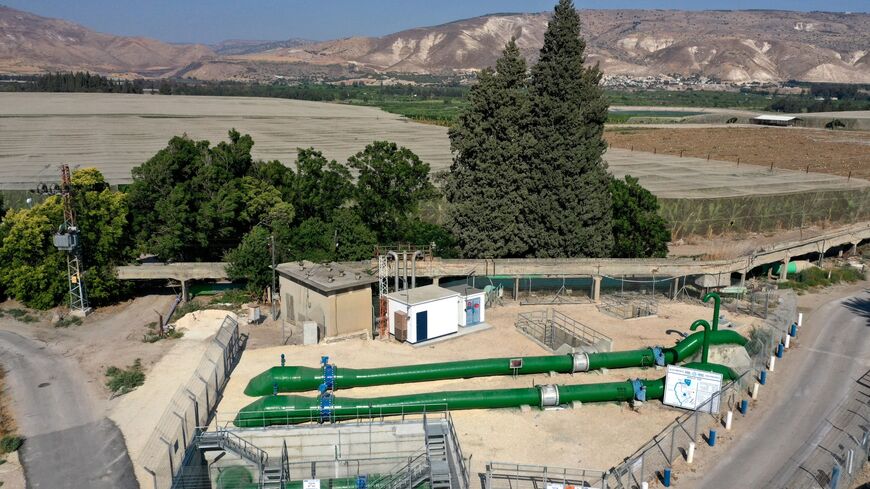Responding to domestic pressure, Jordan has called off a deal to exchange its solar energy for desalinated water from Israel, but it has no good solutions for its own water crisis.
Samuel Wendel. November 24, 2023
In a key blow to climate cooperation in the Middle East, Jordan has suspended a landmark clean energy-for-water deal with Israel — a move with significant implications for post-war diplomacy and the kingdom’s own worsening water crisis.

With the Gaza war overwhelming already strained ties with Israel, Jordan’s Foreign Minister Ayman Safadi told Al Jazeera on Nov. 16 that the country won’t sign an agreement to sell electricity generated via solar power to Israel in return for desalinated water. Dubbed Project Prosperity, the trilateral deal (which includes UAE backing) could boost Jordan’s water supply by roughly 20%, helping alleviate pressure on one of the world’s most water-scarce nations.
The deal marked a new era in water cooperation between the countries, after their 1994 peace treaty hinged in part on resolving long-standing water disputes. Brokered by US Special Presidential Envoy for Climate John Kerry, Project Prosperity has been hailed as a “win-win” byproduct of the Abraham Accords, but it has progressed slowly since it was first announced in 2021. COP28 was expected to produce a binding agreement towards the execution stage.
.see articles link for chart: Jordan’s internal freshwater resources vs population growth, 2000-2020
But Jordan’s decision to suspend Project Prosperity is hardly a surprise, coming barely two weeks after Amman recalled its ambassador from Tel Aviv. Yet the deal faced implementation roadblocks even before the conflict erupted. “Water-for-energy had promise, but there were obstacles from the outset,” said Steven Gorelick, a Stanford University professor responsible for the Jordan Water Project, an international research analysis of the kingdom’s freshwater resources.
Big potential, big challenges
With only 97 cubic meters of water available per capita per year, the kingdom is significantly below the absolute water scarcity threshold of 500 cubic meters, according to the World Bank, while climate change and population growth are expected to further reduce those resources by 30% by 2040. “Jordan is headed toward a multi-decadal increase in temperature coupled with more and longer droughts,” said Gorelick.
The plan features two components: Prosperity Green, a UAE-funded 600-megawatt solar plant in Jordan that would produce enough clean energy to power about 500,000 Israeli homes annually; and Prosperity Blue, an Israeli program to export 200 million cubic meters of desalinated potable water annually to Jordan (or roughly a quarter of its current annual water consumption).
The deal was also expected to facilitate better relations. Under the Bennett government, the original declaration of intent also offered to double the amount of water Israel supplied annually to Jordan to reach 100 million cubic meters (a move current Prime Minister Benjamin Netanyahu denounced). Still, the pact also generated public protest among Jordanians after its announcement. That aligned with significant backlash to a secretive 2016 energy deal, when Jordan agreed to pay Israel $10 billion over 15 years to import natural gas.
Project Prosperity faced criticism in the UAE and Israel for advancing too slowly due to bureaucratic hurdles. The partners signed another MoU in 2022 at COP27 to address obstacles. That produced more engagement in 2023, headlined by Israeli Energy Minister Israel Katz meeting with Emirati, Jordanian and US officials in the UAE in August to discuss binding agreements at COP28.
Alternative options
Jordan’s water security aspirations now largely hinge on developing its own Red Sea desalination plant at Aqaba, a project known as the National Water Carrier, which the government first announced in 2021.
The government is now making a point to promote the plan, described as the kingdom’s largest-ever infrastructure project. “There is no other independent water source to satisfy the needs of the country and to be under Jordanian sovereignty,” said Elias Salameh, a former University of Jordan hydrology professor and an expert on water in the kingdom.
The plant would pump 300 million cubic meters of desalinated water annually to Amman, about 300 miles from Aqaba. Jordan hoped to begin work by 2023 and pump water by 2028, but the project has faced funding and feasibility questions. It’s expected to cost about $3 billion, according to the European Investment Bank, which committed about $200 million to the project in December 2022. Backers have pledged at least $2.35 billion in project financing, with the United States putting up $700 million.
Five consortiums were prequalified to bid on the project, including Saudi Arabian utility developer Acwa Power, but two bidders have since withdrawn. The submission deadline has been pushed back several times, most recently until December 2023, according to Jordan News.
Future prospects
Putting Project Prosperity on ice was a natural move for a government responding to domestic outrage inflamed by the war. However, some links will be harder to sever — like its Israeli gas imports, which could now face increasing scrutiny.
The move underlines Jordan’s reliance on Israel to secure water allocated by the 1994 treaty. A worsening war could also affect Jordan’s peace agreement with Israel. This will heighten the Red Sea desalination plan’s importance, while perhaps compelling Gulf states to assist with the project. For instance, on Nov. 1 the UAE and Jordan agreed to expand investment cooperation, including infrastructure development.
Still, this plant is years away from supplying water and could face further delays, while other short-term options don’t provide much relief. According to Salameh, if Jordan doesn’t receive enough rainfall in the coming few years, it will have to further deplete groundwater resources and lease water from agricultural wells in the highlands to supply households, and potentially hire desalination vessels to serve Aqaba.
Water relations could feature prominently in a post-war peacebuilding process, and Jordan may face pressure to revisit Project Prosperity in some form. However, such cooperation seems like a pipe dream for the foreseeable future. “As it stands, water-for-energy traded between Jordan and Israel is one potentially valuable idea that is out of reach,” said Gorelick.
